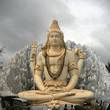Buddhism and Hinduism share common roots in India’s millennia-old contemplative tradition, and may have more similarities than differences. Yet their differences are more illuminating; in understanding how the two diverge crucially, they offer two unique paths of spiritual transformation to anyone inclined.
Shakyamuni Buddha and the Three Marks of Existence
 On his enlightenment, Shakyamuni Buddha began expounding a doctrine that differed in important ways from that of the ruling Brahmins, or priests, of the day. One major teaching, encompassing a huge swath of Buddhist wisdom, is known as the Three Marks of Existence, and will demonstrate certain disparities in Buddhism and Hinduism’s beliefs.
On his enlightenment, Shakyamuni Buddha began expounding a doctrine that differed in important ways from that of the ruling Brahmins, or priests, of the day. One major teaching, encompassing a huge swath of Buddhist wisdom, is known as the Three Marks of Existence, and will demonstrate certain disparities in Buddhism and Hinduism’s beliefs.
The three marks are Anitya, or impermanence; Duhkha, or suffering; and Anatman, or not-self.
The Buddhist Teaching of Anitya—Impermanence
In Hinduism, individuals possess an enlightened, immutable essence known as the Atman that persists after death; Shakyamuni Buddha overturned the Hindu notion of eternal selfhood through the doctrine of impermanence. The apparent self was minutely dissected into moments and ‘heaps’ of experience and cognizance through early Buddhist psychology, known as the Abhidharma.
In the realization of the Abhidharma, a spiritual transformation is effected through meditation in which the individual joins a continuum of experience absent of the delusion of self and other.
The Buddhist Teaching of Duhkha—Suffering
Hinduism is predicated on the pursuit of bliss (sukha); spiritual transformation is understood to be a release into an oceanic and enduring ecstasy. Shakyamuni Buddha, meanwhile, considered the all-pervasive suffering of unenlightened existence as the main impetus toward enlightenment.
Through outlining the nature of suffering in painstaking detail, Buddhism gives the aspirant plentiful motivation to end suffering wherever it is found. Thus, both Buddhism and Hinduism aspire to an enlightenment much contrasted with unenlightened existence, but emphasize different facets of the relationship.
The Buddhist Teaching of Anatman—Not-Self
Atman, as described above, is the Hindu conception of an eternal and immutable personal essence. Shakyamuni Buddha challenged this doctrine, declaring that all phenomena, or dharmas, were conditioned and would thus decay.
In Buddhism, spiritual transformation is only possible through transcending the self, not through purifying or perpetuating it; thus, practices such as mindfulness meditation are meant to pierce the illusory veil of mental habits (karma) that appear to constitute a permanent entity independent of its surroundings.
Scholars of both Hinduism and Buddhism have furiously debated the above topics, among many others, since the inception of Buddhism. Yet while the differing ideas offer an important choice for the spiritual aspirant, these differences may ultimately be cosmetic (for similarities, see What Hinduism and Buddhism Share): the enlightenment of thousands of masters in each tradition stand testament to the universal, non-conceptual heart of wisdom.




